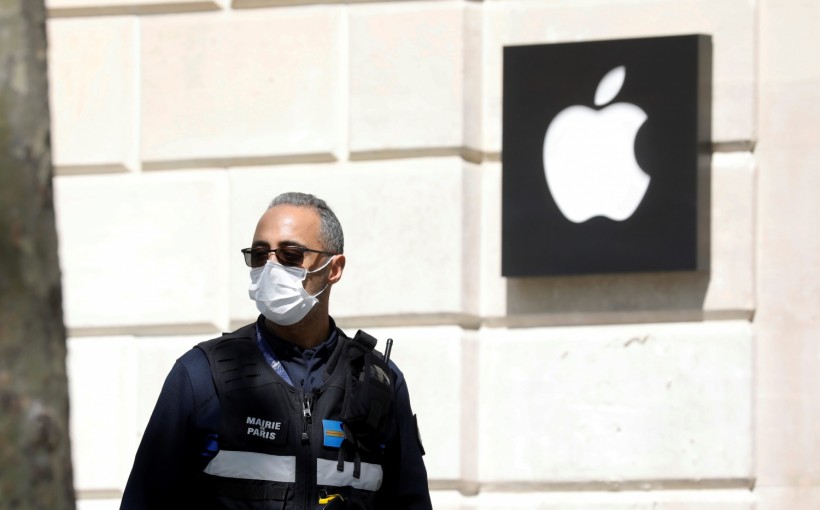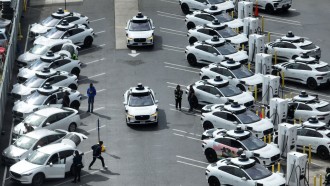COVID-19 tracking apps being rolled out by Apple and Google has an expiration date, the tech giants say. The companies say Bluetooth interoperability for Android and iOS may not be used after the general public health crisis caused by the respiratory disease passes.

A municipal policeman wearing a protective face mask walks past the closed Apple store on the Champs-Elysees avenue in Paris as a lockdown is imposed to slow the rate of the coronavirus disease (COVID-19) in France, April 16, 2020.
Government officials have turned to technology and surveillance tools to track the unfolding of COVID-19, the respiratory disease resulting from a novel coronavirus. While the app helps public health officers control the disorder, privacy advocates and lawmakers expressed concern over measures taken during the emergency will live longer than the pandemic.
When Google and Apple announced their COVID-19 tracking tools, the corporations cited that they could disable its functionality once it is no longer needed. The duo, according to The Verge, committed shutting the system down absolutely while the pandemic ends.
ALSO READ: Apple Reluctant Over France's Request to Lift Bluetooth Limits and Allow Contact Tracing App
Tech giants say trust and privacy remain crucial to apps
Apple and Google said that trust and privacy are crucial to the apps as they need as many people as possible to choose in for the tracking capabilities. The organizations have taken measures to make sure people's identities aren't associated with their tool's Bluetooth codes, like resetting the ID every 14 days. Apple also assured senators the data obtained by the app remains confidential with its coronavirus tools.
Google said the app would only be used by public health officials for managing the COVID-19 pandemic, and that it is going to be turned off as soon as the health crisis ends.
Apple and Google said the application will be opt-in, CNET reported. Meaning, the location services won't be activated by default.
Apple and Google would then plan to provide software updates to more than two billion active devices across the world using their software program by the end of the year.
The groups began discussing the project two weeks ago. It shared initial planning documents publicly to provide security researchers, companions, and critics a way to start vetting the technology.
Apple and Google said they'd update the contact tracing software to make sure people can not be publicly tracked. The companies would also "protect" any identifiable records about a person's mobile phone, along with which model of cellphone they are using or the signal strength of their transmissions.
Skeptics remain despite the assurance
Apple said it's working with authorities on when the app could be enabled and disabled in the region. Google said public authorities could only use the app to deal with the health crisis. Still, privacy watchdogs are skeptical, mentioning surveillance escalations in past crises.
Albert Fox Cahn, executive director of the Surveillance Technology Oversight Project, told CNET everyone could learn the USA Patriot Act and other 'temporary' post 9/11 surveillance for this coronavirus pandemic.
"We're still fighting to roll back is that emergency responses rarely are as short-lived as the emergency," he explained.
The threat from COVID-19, according to Cahn, won't merely disappear. "We simply can't trust tech giants to roll back this invasive and potentially profitable surveillance net simply because they say they will," Cahn added.
Operating system updates that permit the Apple and Google contact tracing app won't be available until May. Even then, develop apps that will take advantage of the capability would be up to public health officials' decision. The update will allow iOS and Android gadgets to ping every other using Bluetooth Low Energy generation.
ALSO READ: Coronavirus: Bluetooth Apps Are Bad at Discovering New Cases of COVID-19, Experts Say
Apple and Google, however, did not clarify what "disabling the app" could mean. Neither of the companies explained if the app might be updated on the next wave of infections, or if it would be permanently deleted from gadgets.
Jennifer Granick, surveillance and cybersecurity counsel for the American Civil Liberties Union, told CNET the companies are correct on assuring they'd shut down the apps when the COVID-19 crisis is over.
"[However, the public needs] to know the basis the companies would use to indicate when to turn this tracking off," Granick said.








